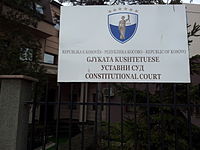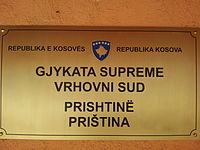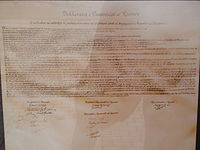 |
|---|
| Constitution and law |




The Constitution of Kosovo (Albanian: Kushtetuta e Kosovës, Serbian: Устав Косовa, Ustav Kosova) is the supreme law (article 16) of the Republic of Kosovo, a territory of unresolved political status. Article four of the constitution establishes the rules and separate powers of the three branches of the government. The unicameral Assembly of the Republic exercises the legislative power, the executive branch led by the President and the Prime Minister which are responsible for implementing laws and the judicial system headed by the Supreme Court.[1]
The constitution was signed on 7 April 2008 at 13:00 local time at the national library in Pristina.[2] The constitution was ratified on 9 April and came to effect on 15 June 2008.[3][4]
The Constitution of the Republic of Kosovo can be changed through the amendment process (article 144). Constitutional amendments are added to it, altering its effect. The foreword of the constitution reads:
We, the people of Kosovo, determined to build a future of Kosovo as a free, democratic and peace-loving country that will be a homeland to all of its citizens; committed to the creation of a state of free citizens that will guarantee the rights of every citizen, civil freedoms and equality of all citizens before the law; committed to the state of Kosovo as a state of economic wellbeing and social prosperity; convinced that the state of Kosovo will contribute to the stability of the region and entire Europe by creating relations of good neighborliness and cooperation with all neighboring countries; convinced that the state of Kosovo will be a dignified member of the family of peace-loving states in the world; with the intention of having the state of Kosovo fully participating in the processes of Euro-Atlantic integration; in a solemn manner, we approve the Constitution of the Republic of Kosovo.
Article 7, ensures the values and freedoms by the rule of law, equality same as respect, gender equality and social justice and the neutrality towards religion by the article 8 of the Constitution.[5][6] The constitution guides Kosovo's law and political culture.[7] Writers were influenced mostly by two documents: the Ahtisaari plan[8] and the fourhand – and the United Nations Security Council Resolution 1244[9] which was the base document for a period from 10 June 1999.[10] The final authority for the interpretation of the constitution of the Republic of Kosovo is the Constitutional Court of Kosovo.
Kosovo lawyers and politicians have repeatedly called for amendments or a thorough revision of the constitution. Proposals include removing the prohibition of unification with Albania (art. 1.3), allowing direct elections for the president, and improving the language of the document.[11] Alternative draft constitutions have also been proposed, before and after the declaration of independence.[12][13]
- ^ Government profile
- ^ "Pristina, Kosovo, 7 April 2008 – The Constitutional Commission submits the Proposed Constitution to the President of the Republic of Kosovo". 7 April 2008. Archived from the original on 9 June 2011. Retrieved 25 December 2017.
- ^ "Kosovo adopts a new constitution". 9 April 2008. Retrieved 25 December 2017.
- ^ "Euronews". Archived from the original on 21 June 2018. Retrieved 24 February 2013.
- ^ "Ambasada". Archived from the original on 30 September 2018. Retrieved 24 February 2013.
- ^ "option=com_content&task=view&id=64&Itemid=28&lang=en Gazeta zyrtare". Archived from the original on 23 May 2013. Retrieved 24 February 2013.
- ^ "Law.umn" (PDF). Archived from the original (PDF) on 23 December 2014. Retrieved 24 February 2013.
- ^ yris.yira
- ^ 1244
- ^ yris
- ^ "Përmbledhje për Ditën e Kushtetutës". 9 April 2019.[permanent dead link]
- ^ "Kushtetuta e përkohshme e Kosovës". Retrieved 15 July 2019.
- ^ "Projekt-kushtetutë për Kosovën". 10 June 2018. Retrieved 15 July 2019.